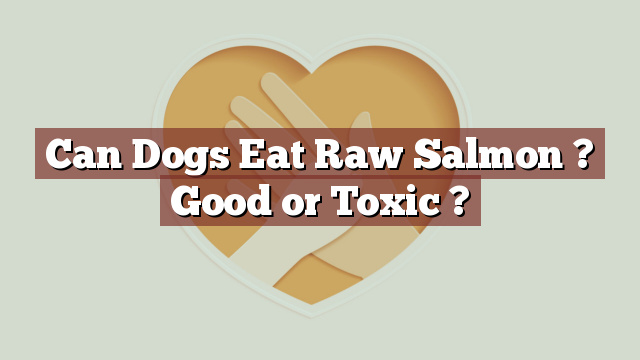Can Dogs Eat Raw Salmon? Good or Toxic?
Dogs, like humans, require a well-balanced diet to stay healthy and strong. As responsible pet owners, it is crucial for us to know what foods are safe for our canine companions. While salmon is considered a highly nutritious fish for humans, the question remains: can dogs safely consume raw salmon? In this article, we will delve into the nutritional value of raw salmon for dogs, explore professional insights on its safety, discuss potential risks and benefits, and provide guidance on what steps to take if your dog has consumed raw salmon.
Nutritional Value of Raw Salmon for Dogs: A Detailed Analysis
Raw salmon is abundant in nutrients that can be beneficial for dogs. It is a rich source of Omega-3 fatty acids, high-quality protein, and essential vitamins such as Vitamin D and Vitamin B12. These nutrients contribute to healthy skin and coat, promote brain development, support a strong immune system, and aid in the maintenance of proper bodily functions. Additionally, the high protein content in salmon can be particularly beneficial for active and growing dogs.
Is Raw Salmon Safe or Toxic for Dogs? Professional Insights
While raw salmon may seem like a healthy addition to your dog’s diet, it is important to be aware that there are potential risks associated with feeding dogs raw fish. Raw salmon can contain parasites such as tapeworms or flukes, as well as harmful bacteria like Salmonella or Listeria. These organisms can lead to foodborne illnesses in dogs, resulting in symptoms such as vomiting, diarrhea, abdominal pain, and even more severe complications.
Veterinary professionals generally discourage feeding dogs raw salmon due to the potential risks it poses. The cooking process not only eliminates parasites and bacteria but also increases the digestibility of the fish, making it safer and easier for dogs to consume.
Potential Risks and Benefits of Feeding Dogs Raw Salmon
Feeding your dog raw salmon comes with both potential risks and benefits. While the Omega-3 fatty acids and other nutrients present in salmon can support your dog’s overall health, the risk of foodborne illnesses cannot be overlooked. The parasites and bacteria present in raw salmon can cause serious health problems for your dog, and in some cases, may even be life-threatening.
Moreover, the potential risks associated with feeding raw salmon extend beyond the health of your dog. Handling raw fish can also pose risks to humans, as the bacteria present can be transmitted to humans through contact or ingestion.
My Dog Ate Raw Salmon: Steps to Take and Watch for Symptoms
If your dog has consumed raw salmon, it is important to take immediate action and closely monitor their behavior and health. Contacting your veterinarian should be your first course of action, especially if the amount of salmon consumed was significant or if your dog shows any abnormal symptoms. The vet will provide you with specific guidance tailored to your dog’s situation and may recommend certain diagnostic tests or treatment options.
Common symptoms to watch for after your dog has consumed raw salmon include vomiting, diarrhea, lethargy, loss of appetite, abdominal pain, and dehydration. It is crucial to provide your vet with accurate information about the amount and type of salmon consumed, as this will help them make an informed decision regarding your dog’s treatment.
Conclusion: Weighing the Pros and Cons of Feeding Dogs Raw Salmon
In conclusion, while raw salmon offers several nutritional benefits for dogs, the potential risks associated with feeding them this fish outweigh the advantages. Raw salmon can contain parasites and harmful bacteria that can lead to foodborne illnesses in dogs, potentially posing serious health risks. Therefore, it is generally recommended to cook salmon thoroughly before feeding it to your canine companion. By doing so, you can ensure their safety and well-being while still providing them with the necessary nutrients found in this fish.
As responsible pet owners, it is our duty to prioritize the health of our furry friends. By consulting with a veterinarian and understanding the potential risks and benefits of different foods, we can make informed decisions when it comes to our dog’s diet. Remember, a balanced and nutritionally appropriate diet is crucial for your dog’s overall health and longevity.
Thank you for investing your time in exploring [page_title] on Can-Eat.org. Our goal is to provide readers like you with thorough and reliable information about various dietary topics. Each article, including [page_title], stems from diligent research and a passion for understanding the nuances of our food choices. We believe that knowledge is a vital step towards making informed and healthy decisions. However, while "[page_title]" sheds light on its specific topic, it's crucial to remember that everyone's body reacts differently to foods and dietary changes. What might be beneficial for one person could have different effects on another. Before you consider integrating suggestions or insights from "[page_title]" into your diet, it's always wise to consult with a nutritionist or healthcare professional. Their specialized knowledge ensures that you're making choices best suited to your individual health needs. As you navigate [page_title], be mindful of potential allergies, intolerances, or unique dietary requirements you may have. No singular article can capture the vast diversity of human health, and individualized guidance is invaluable. The content provided in [page_title] serves as a general guide. It is not, by any means, a substitute for personalized medical or nutritional advice. Your health should always be the top priority, and professional guidance is the best path forward. In your journey towards a balanced and nutritious lifestyle, we hope that [page_title] serves as a helpful stepping stone. Remember, informed decisions lead to healthier outcomes. Thank you for trusting Can-Eat.org. Continue exploring, learning, and prioritizing your health. Cheers to a well-informed and healthier future!

